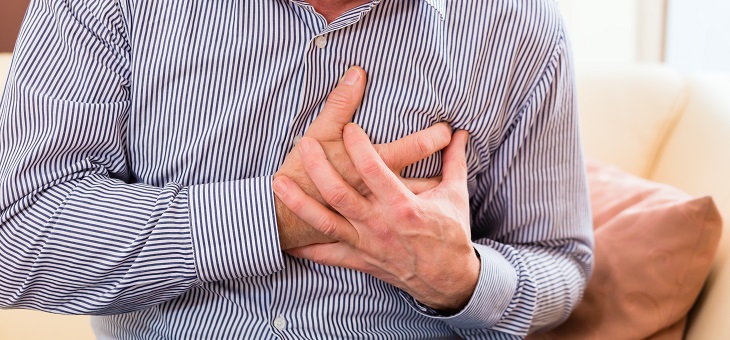Heart attacks occur when the blood flow to the heart is restricted or ceases completely. This is often caused by a blood clot that forms when plaque builds up in a coronary artery and then ruptures.
The plaque that builds up is caused by bad cholesterol, fats and other waste products. When plaque bursts, it forms a blood clot that can quickly disrupt blood flow to the heart. When heart tissue goes without oxygenated blood it will die, likely leading to heart failure and other complications.
So, what does a heart attack feel like?
Contrary to popular belief (or the heart attacks you see in movies), not all heart attacks involve sharp pain and a dramatic clutching of the chest. Other symptoms may be subtler, such as light-headedness and shortness of breath.
People experience heart attacks in different ways. And women experience heart attacks differently to men, says the Heart Foundation.
What a heart attack feels like for men
The most common sign of a heart attack in men is chest pain, often described as pressure or a squeezing sensation. Pain may be located in the centre of the chest or from armpit to armpit.
Other symptoms for men include:
- shortness of breath
- back pain, that often moves up to the neck
- arm pain, typically in the left arm, but can be in either or both arms
- jaw pain that sometimes feels like a bad toothache
- nausea
- sudden cold sweat
- light-headedness or dizziness.
What a heart attack feels like for women
The most common sign for women is also chest pain or tightness, but also pain in the upper abdomen. Women are also more likely to experience non-traditional symptoms, such as:
- fatigue, which may present as flu and be present for days ahead of a heart attack
- upper back pain, with sensations including burning, tingling or pressure
- neck and jaw pain
- pain, tingling or discomfort in either or both arms
- nausea and vomiting
- shortness of breath.
While nausea or fatigue can signal many other health issues, you should be mindful that these symptoms don’t happen simultaneously with any of the above.
Silent heart attacks
Some heart attacks have no noticeable symptoms. They’re called silent heart attacks and they represent almost half of all heart attack occurrences in Australia.
Often, they will resolve themselves but can still cause long-term damage. A silent heart attack may be discovered months or years after you’ve had one. If a doctor discovers that you’ve had a silent heart attack, you may be prescribed cardiac rehabilitation.
How long does a heart attack last?
Symptoms will often last about 10 minutes or longer. Symptoms lasting fewer than five minutes are less likely to indicate a heart attack, but anything longer should be taken seriously. If you feel you are at risk of a heart attack, regardless of timeframes, you should call your GP or emergency services. While on the phone, chew 300g of aspirin, unless you’ve been told not to take it.
Download a heart attack action plan from the Heart Foundation.
Have you ever had a heart attack? What did it feel like?
Related articles:
Unexpected heart attack triggers
10 tips for a healthier heart
Is your sex life ageing well?

